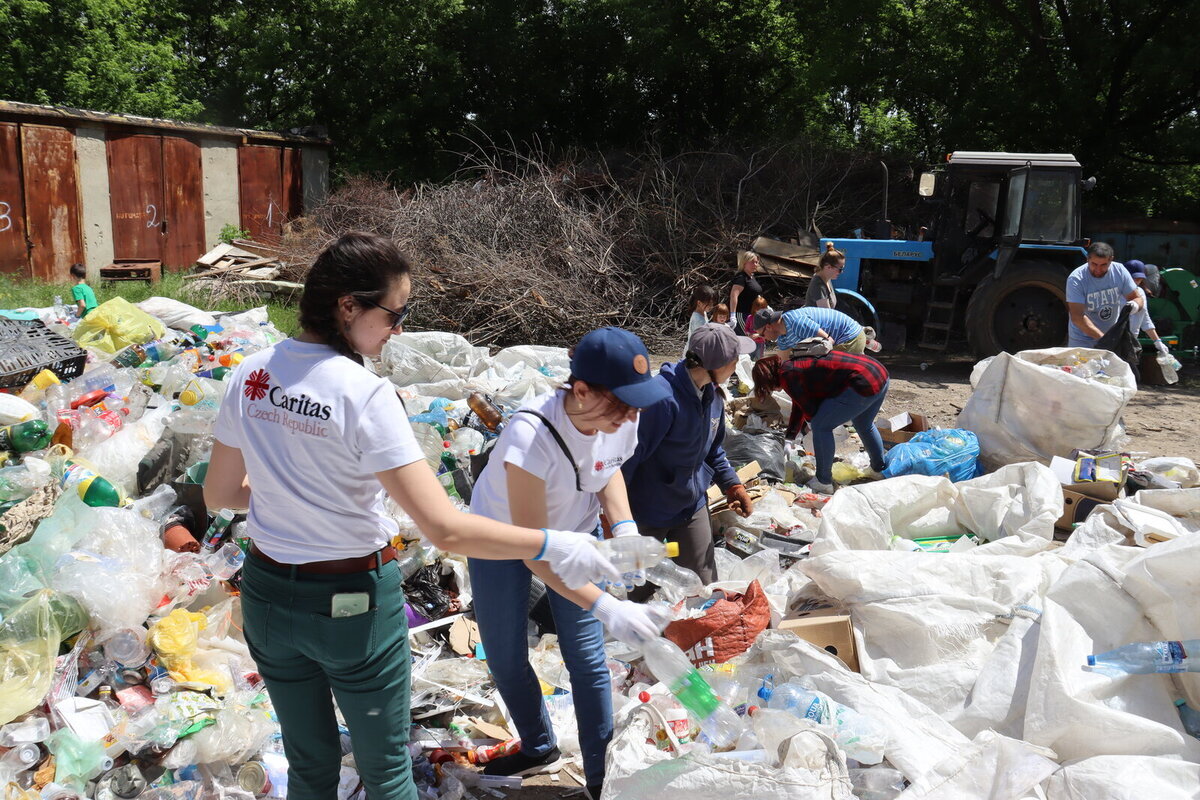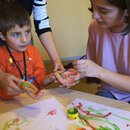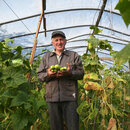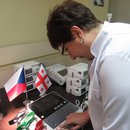Environmental pollution is a major challenge in today's world. While urban, industrial, economic, and technological development offer invaluable benefits, they pose risks to human life and health. Georgia faces significant environmental challenges due to human impact and climate change, and that is the main reason why, in recent years, Caritas Czech Republic has been actively advocating for protecting the environment in Georgia in many ways – starting with the successful endeavors of introducing sustainable waste management practices and development of waste management infrastructure, ending with the initiatives aiming at promoting sustainable wastewater management in rural areas.
That is how we started
In the regions of Georgia, up to 60% of the waste in landfills is organic waste, which decomposes and releases carbon dioxide and methane. This contributes to climate change and is also harmful to human health. Since 2018, Caritas Czech Republic has concentrated its environmental efforts on raising awareness about sustainable waste management in rural Georgia, and with this in mind, we have actively supported the development of infrastructure for waste collection, separation, and recycling in various regions of the country.
In the Racha-Lechkhumi and Kvemo Svaneti region, we have introduced waste separation, recycling, and composting practices and provided technical assistance to Dusheti and Khulo municipalities. Moreover, Caritas Czech Republic has made significant steps forward in advancing waste management and environmental practices – three waste trucks and 299 waste bins were provided to the municipalities of Oni, Ambrolauri, Tsageri, Lentekhi, Dusheti, and Khulo.
Caritas Czech Republic has worked strategically with the municipalities of Georgia. We developed waste recycling models for Oni, Ambrolauri, Lentekhi, and Tsageri municipalities, which the respective municipal governments later approved. A comprehensive inter-municipal waste recycling model was also created for the Racha-Lechkhumi and Kvemo Svaneti regions and was adopted by the regional government.
Composting practices in villages
Composting is a straightforward and budget-friendly method for preventing environmental pollution. We unlock numerous environmental benefits by recycling food and other organic waste into compost. Composting enhances soil fertility, minimizes soil erosion and greenhouse gas emissions, recycles nutrients, and helps buffer the effects of droughts. Additionally, compost serves as a nutrient-rich fertilizer for organic farming.
Caritas Czech Republic was key in empowering 127 farmers through capacity-building sessions in composting practices. Additionally, 56 subsistence farmers and 15 schools were provided with the necessary equipment to produce compost in the Racha-Lechkhumi and Kvemo Svaneti region. Also, 30 teachers received training in environmental education, while 459 pupils and youth learned about the circular economy in the Racha-Lechkhumi and Kvemo Svaneti regions.
Manana Metreveli, a resident of the village of Utsera in the Racha-Lechkhumi and Kvemo Svaneti region, has been creating compost in a ground hole for years. Caritas Czech Republic's environmental project gave her a wooden compost box and the necessary equipment for composting. She also attended training sessions to learn how to compost effectively.
Manana finds the box too large for her needs as she lives alone, so she invites her neighbors to join her in making compost in her yard. This community effort not only helps her make better use of the box but also fosters collaboration among the villagers:
"They often bring waste to my yard and call over me — “Here, Mananiko, I brought the waste to put in the compost.” I am especially happy when children are actively involved in such activities — they see what we are doing and repeat it, and they feel responsible. Raising awareness on this topic is of great importance, and in this regard, the guidelines distributed by the Caritas Czech Republic and the practical training sessions conducted on the spot played a great role."
Waste management strategy for Oni Municipality
In Georgia, municipal wastewater is the primary cause of surface water pollution, which leads to environmental and health issues. After building success stories together with the Oni municipality government to develop sustainable waste management practices, our organization has shifted its focus to addressing water pollution challenges. Since September 2022, we have been working on an initiative to support sustainable wastewater management in the municipality of Oni.
Caritas Czech Republic developed a comprehensive wastewater management strategy and action plan, which was shared with the Oni municipal government and the municipal water supply network maintenance center. Additionally, 25 representatives from public administration, self-government, and civil society received training to enhance their wastewater treatment and best practices skills.
Also, in awareness-raising sessions on sustainable wastewater management, Caritas Czech Republic engaged 50 students from public schools of Oni Municipality and awarded them with water quality testers. In order to ensure the sustainability of the educational activities, Caritas Czech Republic conducted ToT training on sustainable wastewater management for the teachers of Oni municipality.
As Tamar Shervashidze, Caritas Czech Republic’s project manager says to contribute to the water quality and resources management in Georgia, we supported Oni Municipality in building wastewater treatment infrastructure and piloted most applicable wastewater treatment technologies in eight hotspots of municipality:
“To ensure the sustainability of the project results, Caritas Czech Republic developed the replication strategy on the sustainable wastewater management and enabling neighboring municipalities to learn from the best experiences.”
The organization's commitment to improving the region's wastewater management capabilities is evident in installing eight model wastewater infrastructures in Oni municipality. These efforts reflect Caritas Czech Republic's dedication to creating a cleaner, healthier environment for the local community. Within the project framework, we handed over an assanization vehicle to the Oni municipality, which will help them set up the wastewater management infrastructure.
Ekaterine Meskhrikadze, Deputy Head of Caritas Czech Republic in Georgia and Project Manager, says that there is a direct connection between the quality of life and the environment because the healthy state of the physical environment has a significant impact on people's lives:
"Water pollution from sewage, industrial, agricultural, and pharmaceutical waste causes environmental and health problems. In Georgia, particularly in rural areas, access to improved sewage systems and appropriate wastewater management remains challenging. Within this project, our goal is to increase the skills of local stakeholders so that they can better respond to these challenges and thus contribute to increasing the quality of life and improving the local population's health. This project is planned so that it will be possible to replicate the developed solutions in other municipalities of Georgia."













